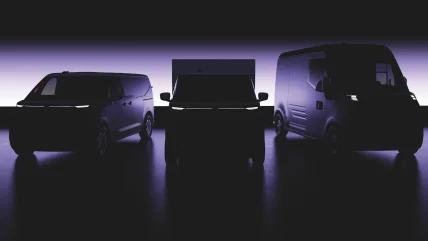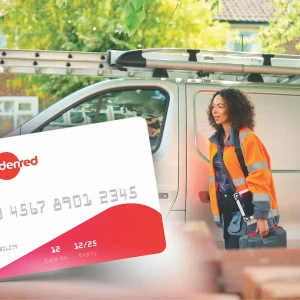
We are entering a new age of purpose-built electric vehicles, many of which are being designed for applications far beyond how we conventionally view today’s vans.
At present, the majority of electric vans launched are conversions of ICE vehicles, utilising the same chassis and much of the hardware but replacing engines and gearboxes for motors and batteries. The next generation of fully electric vans will, though, be radically different. Mercedes- Benz is promising a multi-application platform with their VAN.EA project, while Kia revealed its intentions for its range of PBV (Purpose Built Vehicles) using a scalable chassis with ambitions to integrate it fully into the architecture of a modern city.
OEMs are waking up to the possibility that the traditional solutions currently employed might not be the answers going forward and are taking the transition away from fossil fuels as an opportunity to re-invent the wheel – so to speak.
That certainly appears to be the intention of the latest planned entry into the commercial vehicle space, Flexis, an entirely new venture formed between Renault Group, Volvo Group and global logistics and shipping company CMA CGM to develop dedicated EV platforms for commercial vehicles.
“This is a revolutionary project. There is space for disruption,” says Luca de Meo, CEO of Renault Group.
“It’s a family of products, the classical vans, and the things you can completely reform, because there is a way of building, Lego-like customisation. [It will be a] really unique product which you will see doesn’t [already] exist, designed for last mile delivery. It’s very tall and very short, the size of a Kangoo small van, the cargo capacity of a mid-van and it turns like a car because you don’t have an engine in the front,” de Meo explained at the launch event that took place last month.
Renault, which has been a dominant force in European van sales for several decades, will partner with Volvo Group – specifically Renault Trucks, which already sells Renault vans through its dealer network – with a healthy dose of real-world desires coming from French firm CMA CGM, which already operates fleets of electric vehicles.
“Partnership is the new leadership. You can have great equipment, but in the equation if you don’t have Infrastructure x Green Energy x TCO x sustainable supply chain, it will not happen. If one of these parameters is zero, [the answer to the equation] is zero. Therefore, we need to partner up,” explains Martin Lundstedt, CEO and president of Volvo Group.
“We have the Renault brand in common that we can start with now, but there are different opportunities. We don’t have a volume issue, we already have the backbone scale in the value chain from supply, industrialisation, product knowledge, service, service network and customer base,” Lundstedt adds.
The resulting product will be a skateboard design intended to dramatically reduce ownership and usage costs for operators by as much as 30%.

“Imagine in the life cycle of such a product people spend between €100,000 (£86,000) and €120,000 (£103,000) to pay for gasoline, maintenance and insurance. If you reduce that by 30% it means that the van will be free – that’s the revolution. We’re fighting hard but I think it’s a good example of how the European, truck and logistics industry is moving into attack mode, reinventing itself and playing [as a] collective,” de Meo says.
By partnering with Qualcomm and Google as suppliers to create an Android-based electronic architecture for the new vans, de Meo says there is huge scope for additional services to be created, pointing towards the huge engineering base of more than six million developers using Google/Android systems. This, he says, will create horizontal partnership opportunities for a software defined vehicle with an open ecosystem providing many different solutions in different sectors, rather than the traditional vertical model currently employed where manufacturers build something for themselves with a more siloed mindset.
“You can do these things yourself, but we try to partner with the best to solve the problem. By doing that we share the risk, we have a better quality of capital allocation but we also learn everyday. Why don’t we, as people with 100 years of experience, reinvent ourselves and change the game?” de Meo says.
The first vehicles aren’t expected to arrive in the market until 2026, but de Meo already has an eye on numbers and underlined that while all parties involved expect to make money it’s more about reducing costs and emissions for operators.
“Commercial vehicles is a very complicated business, but we are still in the position to do volumes. From a price point of view, let’s say this project will be more expensive than a Trafic (medium van) with a diesel engine. The key thing is not the price list but the business plan we are providing to the customer with the total cost of ownership that is 20 to 30% lower than a conventional project. That’s where we can be really radical,” he says.
The vans are expected to be sold under the Renault and Renault Trucks umbrellas, but may not use the Flexis name which de Meo reiterates is presently just the name for the legal entity of the joint venture. It is likely that the final product will also not be exclusively for the two Renault brands.
“We are in discussion with Nissan, they already take Kangoo, Trafic and Master and we will maybe take advantage of that. The idea is that we will for sure have vans that are white label,” de Meo explains.
With backing from such a large logistics firm like CMA CGM from the beginning – CMA CGM will take a 10% shareholding – the rest being split equally between Renault Group and Volvo Group – operators appear to be at the heart of the new vans while all parties also have a clear mandate to reduce emissions.
“This initiative will allow us as a logicistcs company to utilise about 1,500 utility trucks that will be able to go around cities without emitting any CO2 emissions – that will be quite remarkable,” explains Rodolphe Saadé, chairman and CEO of CMA CGM.
While giant logistics firms like Amazon have backed start-up projects, like Arrival, in the past, the collective strengths of these three partners seems greater and their mission more defined. From improving driver welfare, employee productivity and vehicle utilisation through to decarbonisation and sustainability, the focus already seems razor sharp.
Although the success of any new product launch will ultimately be defined by sales, it feels like this venture is as much about kickstarting change, generating competition and fostering innovation in hardware and software, as much as it is about vans.
“Decarbonisation is everything, the climate cannot wait,” Lundstedt says. “Covid made it clear that we cannot be without very professional logistics, and logistics will continue to increase in volume because of the megatrends towards urbanisation, e-commerce, and growing populations, but it must be considerably more sustainable,” he adds.
With the global reach of Renault Group and Volvo Group extending to almost every country on the planet, perhaps horizontal partnerships really will be the way forward to ensure vans of the future are integrated and aligned to our needs and our goals.
The common good
Listening to Luca de Meo and Martin Lundstedt, the CEOs of Renault Group and Volvo Group, speak for nearly two hours, presenting and answering questions on their new joint venture there were many important messages to take away but a few things de Meo said really struck a chord with me for their overarching altruism.
Firstly, he said: “There is a tendency to confuse CO2 with pollution. CO2 is a global problem, pollution is concentrated in urban areas.” He later followed up with: “You have to see this project as an initiative from a bunch of entrepreneurs who are trying to push the European economy.”
Remember these are the CEOs of huge corporations who have responsibilities to shareholders to think about, but the focus is on the environment and society. Granted, a successful joint venture will please investors but the pair genuinely seemed just as intent on solving wider collective problems from the economic threat posed by developing nation states to noise pollution or engine emissions, as they were on launching a new van brand. Yet, the most striking statement, underlined in my notes, was: “When you do something that is right, you are never wrong”. Although it was said in reference to customers, it felt like they were words to live by.
George Barrow is the UK jury member for the International Van of the Year Award.





